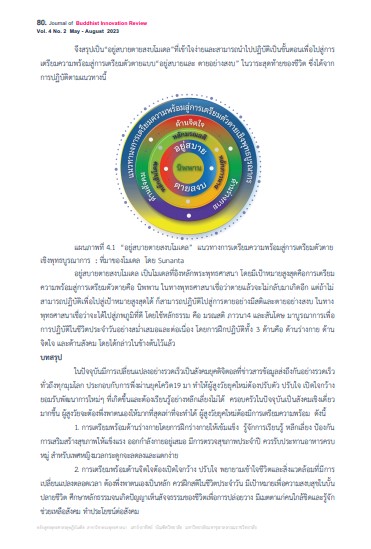THE ELDERLY PREPARATION FOR THE END OF LIFE THROUGH THE INTEGRATED BUDDHISM IN MODERN ERA
Main Article Content
Abstract
The objectives of this dissertation paper are as follows: 1) to study theoretical concepts of the elderly preparation in modern era. 2) to study the integrated principles of Buddhism in the elderly preparation for the end of life in modern era, and 3) to present the guidelines of the elderly preparation for the end of life through the integrated Buddhism in modern era. This is qualitative research using In-depth interview with Key informants and analyzing data by descriptive analytics.
The research found that the elderly preparation in the modern era has 3 aspects of: Physical aspects (having annual health check-up, eating beneficial food), mental aspects (being open-minded, having a purpose in life, being self-reliant), and social aspects (having true friends, being generosity to others and society). The principles of Buddhism including Mindfulness of death, The Four Development, and Contentment. The 3 aspects integrated with those principles are: physical aspects (self-care and observing the Five precepts), mental aspects (practicing meditation aims to have peaceful end of life or attain the nirvana of peaceful), and social aspects (living with contentment, having true friends and preparing for final decisions such as assets, funerals, wills in order to be worry free at the final moment).
The knowledge acquired from this research called “Living comfortably and Die peacefully Model” aiming to reach the ultimate goal of attaining nirvana, which means death without rebirth. The second goal is having a peaceful death, which Buddhism believes would transition to a good rebirth by applying integrated principles of Mindfulness of death, The Four Development, and Contentment to maintain good physical, mental and social aspects by practicing The Five Precepts, Mindfulness of Death and Contentment respectively.
Article Details

This work is licensed under a Creative Commons Attribution-NonCommercial-NoDerivatives 4.0 International License.
เรื่องลิขสิทธิ์/เป็นความคิดเห็นของผู้เขียน
References
เอกสารอ้างอิง :
หนังสือ :
กรมกิจการผู้สูงอายุ (2562). เติมรู้เตรียมพร้อมก่อนสูงวัย. กรุงงเทพมหานคร: จัดพิมพ์โดยกองส่งเสริมศักยภาพผู้สูงอายุ.
พระธรรมธีรราชมหามุนี (โชดก าณสิทฺธิ). (2532). มงคล 38. กรุงเทพมหานคร: หจกการพิมพ์พระนคร.
พระธรรมปิฏก (ป.อ. ปยุตฺโต). (2544). พุทธธรรม (ฉบับเดิม). พิมพ์ครั้งที่ 11. กรุงเทพมหานคร: ดวงแก้ว.
มหาวิทยาลัยมหาจุฬาลงกรณราชวิทยาลัย. (2539). พระไตรปิฎก ภาษาไทยฉบับมหาจุฬาลงกรณราชวิทยาลัย. กรุงเทพมหานคร: โรงพิมพ์มหาจุฬาลงกรณราชวิทยาลัย.
พุทธทาสภิกขุ. (2549). ตายก่อนตายดับไม่มีเหลือ. กรุงเทพมหานคร: บ้านลานธรรม.
สำนักส่งเสริมสุขภาพ กรมอนามัยกระทรวงสาธารณสุข. (2548).การส่งเสริมสุขภาพผู้สูงอายุ.กรุงเทพมหานคร: กระทรวงสาธารณสุข.
สุวัฒน์ มหัตนิรันดร์กุล และคณะ. (2540). เปรียบเทียบแบบวัดคุณภาพชีวิตขององค์การอนามัยโลกทุก 100 ตัวชี้วัดและ 26 ตัวชี้วัด. โรงพยาบาลสวนปรุง: จังหวัดเชียงใหม่.
วารสาร :
พระครูอรรถจริยานุวัตร (สุเทพ ศรีทอง). (มกราคม-ธันวาคม 2564).การเตรียมตัวตายตามแนวพระพุทธศาสนา. วาสารวิชาการโรงเรียนนายเรือด้านสังคมศาสตร์ มนุษย์ศาสตร์และศึกษาศาสตร์. 8(1); 6.
สัมภาษณ์ :
พระอาจารย์ไพศาล วิสาโล. เจ้าอาวาสวัดป่าสุคะโต อำเภอแก้งคร้อ จังหวัดชัยภูมิ. (วันที่สัมภาษณ์ 10 มีนาคม 2566)
พระเมธีวรญาณ ผศ.ดร.. คณบดีคณะพุทธศาสตร์ มหาวิทยาลัยมหาจุฬาลงกรณราชวิทยาลัย. (วันที่สัมภาษณ์ 17 มีนาคม 2566)
Reference :
Boo :
Department of Elderly Affairs (2019). Knowledge for Preparing for Old Age. Bangkok: Published by the Elderly Empowerment Division.
Phra Thamthirarat Mahamuni (Chodok Yanasiddhi). (1989). The 38 Blessings. Bangkok: PhraNakhon Printing House.
Phra Dhammapitaka (P.A. Payutto). (2001). Buddhadhamma (Original Edition). 11th Edition. Bangkok: Duang Kaew.
Mahachulalongkornrajavidyalaya University. (1996). Thai Tripitaka Mahachulalongkornrajavidyalaya Edition. Bangkok: Mahachulalongkornrajavidyalaya University Printing House.
Buddhadasa Bhikkhu. (2006). Dying Before Death, Nothing Remains. Bangkok: Baan Lan Tham. Bureau of Health Promotion,
Department of Health, Ministry of Public Health. (2005). Promoting the Health of the Elderly. Bangkok: Ministry of Public Health.
Suwat Mahatnirankul et al. (1997). A comparison of the World Health Organization's 100- indicator quality of life scale and its 26 indicators. Suanprung Hospital: Chiang Mai Province.
Journal :
Phra Kru Atthachariyanuvat (Suthep Srithong). (January-December 2021). Preparing for death according to Buddhist principles. Journal of the Royal Thai Naval Academy on Social Sciences, Humanities and Education. 8(1); 6
Interview :
Phra Ajarn Paisal Visalo, Abbot of Wat Pa Sukhato, Kaeng Khro District, Chaiyaphum Province. (Interview date: March 10, 2023)
Phra Methee Worayan, Associate Professor, Ph.D., Dean of the Faculty of Buddhist Studies Mahachulalongkornrajavidyalaya University. (Interview Date: March 17, 2023)


